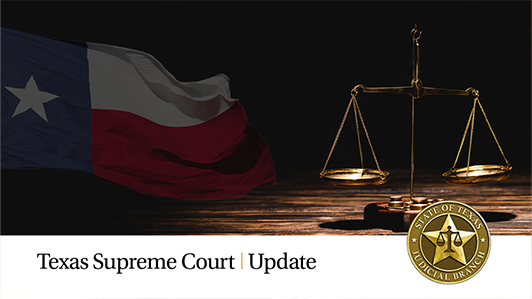
The following are summaries of selected opinions issued by the Texas Supreme Court in May 2024. These summaries are prepared by court staff as a courtesy and are not a substitute for the actual opinions. The summaries are overviews of particular aspects of the opinions; please review the entire opinions.
JURISDICTION – Timely service requirement is jurisdictional prerequisite for suits against governmental entities.
Tex. State Univ. v. Tanner, No. 22-0291, ___ S.W.3d ___ (Tex. May 3, 2024).
The main issue in this case was whether diligence in effecting service of process is a “statutory prerequisite to suit” under Section 311.034 of the Texas Government Code and, thus, a jurisdictional requirement in a suit brought against a governmental entity.
In 2014, Tanner was injured after being thrown from a golf cart driven by her friend, Scott, a Texas State University employee.
Shortly before the two-year statute of limitations ran in 2016, Tanner filed a lawsuit under the Texas Tort Claims Act against the university, Scott, and another defendant. Tanner did not serve the university until 2020, three and a half years after limitations had run.
The university filed a plea to the jurisdiction, alleging that Tanner failed to use diligence in effecting service on the university and arguing that Tanner’s untimely service meant that she had failed to satisfy a statutory prerequisite to suit under Section 311.034. The trial court granted the plea, but the court of appeals reversed.
The Supreme Court reversed and remanded. The court held that the statute of limitations, including the requirement of timely service, is jurisdictional in suits against governmental entities and that the university’s plea to the jurisdiction was the proper vehicle to address Tanner’s alleged failure to exercise diligence. The court reasoned that diligence is a component of timely service and pointed to its precedent holding that if service is diligently effected after limitations has expired, the date of service will relate back to the date of filing. The court also noted that the statute of limitations for personal injuries requires a person to “bring suit” within two years of the date the cause of action accrues, and it cited precedent establishing that “bringing suit” includes both filing the petition and achieving service of process.
The court went on to hold that Tanner could not establish diligence in service on the university. But rather than render a judgment of dismissal, the court remanded to the court of appeals to address in the first instance Tanner’s alternative legal theory that under Section 101.106(f) of the Tort Claims Act, her service on Scott satisfied her obligation to serve the university.
ADMINISTRATIVE LAW – Real-property interest acquired after Medicaid claim arises does not qualify as “home” for Medicaid eligibility purposes.
Tex. Health & Hum. Servs. Comm’n v. Estate of Burt, No. 22-0437, ___ S.W.3d ___ (Tex. May 3, 2024).
The issue in this case was whether an interest in real property purchased after a Medicaid applicant enters a skilled nursing facility qualifies as the applicant’s “home,” excluding it from the calculation that determines Medicaid eligibility.
The Burts lived in a house in Cleburne for many years and then sold it to their adult daughter and moved into a rental property. About seven years later, the Burts moved into a skilled nursing facility. At that time, their cash and other resources exceeded the eligibility threshold for Medicaid assistance. Later that month, the Burts purchased a one-half interest in the Cleburne house from their daughter, reducing their cash assets below the eligibility threshold. They then applied for Medicaid.
The Burts passed away, and the Health and Human Services Commission denied their application after determining that the Burts’ partial ownership interest in the Cleburne house was not their home and therefore was not excluded from the calculation of the Burts’ resources.
After exhausting its administrative remedies, the Burts’ estate sought judicial review. The trial court reversed, and the court of appeals affirmed the trial court’s judgment. The court of appeals held that whether a property interest qualifies as an excludable “home” turns on the property owner’s subjective intent, and that the Burts considered the Cleburne house to be their home.
The Supreme Court reversed and rendered judgment for the Commission. In an opinion authored by Justice Bland, the Court held that under federal law, an applicant’s “home” is the residence that the applicant principally occupies before the claim for Medicaid assistance arises, coupled with the intent to return there in the future. An ownership interest in property acquired after the claim for Medicaid assistance arises, using resources that are otherwise available to pay for skilled nursing care, is insufficient.
The Court observed that federal and state regulations provide that the home is the applicant’s “principal place of residence,” which coheres with the federal statute and likewise requires residence and physical occupation before the claim for assistance arises.
Chief Justice Hecht dissented. He would have held that an applicant’s home turns on the applicant’s subjective intent to return to the house, even if the applicant had not owned or occupied it before admission to skilled nursing care, and that the Burts satisfied that standard.
